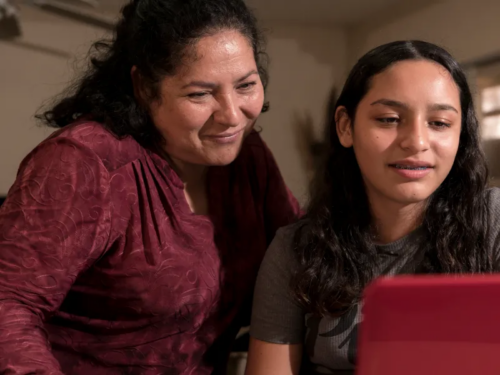
Table of Contents
When Going No Contact With Parents Is the Right Choice, According to Therapists

Written By: Sarah Fielding

Clinically Reviewed By: Clary Figueroa
April 30, 2025
8 min.
Learn about why a person might go no contact with a parent and the emotional impact of their decision.
Learn more about our Clinical Review Process
Table of Contents
“Blood is thicker than water” is a familiar saying that suggests family should always come first.. However, this adage oversimplifies the complexities of family relationships. In reality, maintaining ties with family members isn’t always healthy or safe—and in some cases, the best choice for your well-being might be going no contact with parents.
“We are often taught that family, especially parents, should be honored and preserved at all costs,” says Charlie Health Group Facilitator Bree Williams, LPCA. “But for some, the parent-child relationship can become a source of chronic harm, trauma, or emotional instability. Read on to learn why some people choose to go no contact with their parents, how to cope with the emotional aftermath, and what healing can look like on the other side.

You deserve relationships that support your healing—not ones that harm it
Charlie Health’s virtual programs can help you navigate family estrangement and reclaim your peace.
How often do people go no contact with their parents?
Family estrangement is far from uncommon and can often occur once a child reaches adulthood (and the freedoms that come with that). Take a 2022 study published in the Journal of Marriage and Family, which found that six percent of respondents were estranged from their mothers and 26% from their fathers. The average age at first going to no contact with mothers and fathers was 26 and 23, respectively.
Why do people go no contact with their parents?
As Williams puts it, family estrangement is not a form of revenge. It’s not a sign of dramatics or ungratefulness. “It’s about choosing emotional safety and healing in a space where love should have existed but didn’t, or couldn’t, show up in a healthy way,” she says. “Sometimes people go no contact not because they hate their parent, but because they’ve exhausted every effort to maintain a relationship and are choosing peace over continued pain.”
Charlie Health Group Facilitator Clary Figueroa, MSW, seconds this: “Choosing no contact can be a protective decision when the relationship severely impacts self-esteem, emotional regulation, or daily functioning.” Below are some of the reasons a person might choose to separate themselves from a parent.
1. Abusive behavior
According to the Centers for Disease Control and Prevention (CDC), at least one in seven children across the US experienced abuse or neglect during the last year, though the actual number is likely to be much higher. Abuse could be verbal, emotional, physical, or sexual. “When a parent consistently causes harm and does not acknowledge or change their behavior, it can be healthier for the individual to create distance,” says Figueroa.
Similarly, she adds that a parent might exhibit behaviors such as crossing boundaries, gaslighting, or manipulating their child and making them feel unsafe in the relationship.
2. Being your true self
Each and every person has a right to live as their authentic self as long as they are not hurting themselves or anyone else. Yet, there are parents who will not accept their child for being LGBTQIA+ or still support people and policies that can harm them. “They may decide to go no contact in order to grow and step into a more authentic version of themselves, which a parent may or may not support or understand,” says Charlie Health Licensed Creative Arts Therapist Courtney Way, MA, LCAT.
The aforementioned study from 2022 found that lesbian, gay, and bisexual individuals were more likely to be estranged from their fathers than their heterosexual counterparts. There wasn’t a difference in the number of those not in contact with their mothers.

Yes, Familial Disrespect Can Take a Toll on Your Mental Health — Here’s What to Do
Charlie Health Editorial Team
3. Mental health disorders
When a parent is living with a challenging mental health disorder, such as an untreated personality disorder or substance use disorder, it can create a difficult situation for the child. They might want to help their parent, but they can also experience severe negative impacts. “It might be too difficult or unsafe for the child to maintain a relationship,” says Charlie Health Group Facilitator Chris Hinton, MS, M.Ed., LPC, CLC, CTP.
The emotional impact of estrangement from parents
Whether someone is 100% sure of their decision or not, it can be very painful to cut contact with a parent. It will also impact each person differently, depending on their relationship, reasons, and experience.
“Going no contact can offer freedom and relief, but it often comes with layers of grief, guilt, and emotional conflict — especially when the decision is misunderstood by others,” explains Williams. Here are some of the common emotions people might feel after going no contact with parents.
1. Grief
There’s grief, often accompanying you as you mourn the end of a relationship and give up a hope you might have carried that things would change before having to make this decision. “You’re not just grieving the parent you had, but possibly the parent you wish you had,” says Williams.
2. Guilt and doubt
These two feelings go hand in hand, especially with difficult but important decisions. You might know that a choice is completely right for you, but it doesn’t mean you won’t feel guilt or doubt as you navigate it. These emotions can be even more pronounced when you don’t have as clear a resolve or support from others in your life.
3. Pain of cultural and societal expectations
There are going to be some people who disagree with your choice, no matter what a parent did or said that led to this estrangement. “In many cultures, family is the central relationship, and things such as estrangement may lead to fear of being seen as selfish, unfeeling, cold, or broken,” says Way.
This perspective can add to the sense of guilt and pain. But you don’t need to prove to anyone that you made the right decision or that the situation was bad enough to justify your choice in their eyes. You made the decision for a reason. “Going no-contact is sometimes needed in order to prevent harm and protect yourself, whether it is for a short period or if it is permanent,” adds Way. “Going no-contact is absolutely valid and sometimes necessary.”
4. Relief
It could be immediately after or in waves as time goes on, but you will also likely feel relief. “They may also feel relief to have a greater sense of safety, freedom, and time to heal or be their more authentic self,” says Way.
Williams adds a critical reminder: “This process is not linear. It can feel empowering one day and emotionally devastating the next. That’s normal. Healing rarely follows a straight path.”
How to cope with familial estrangement
There are ways to cope with the experience of going no contact with a parent. “[It] can be incredibly challenging, as it often involves navigating a range of intense emotions, complex family dynamics, and societal pressures,” says Hinton. “However, there are steps one can take to help manage this process and work through the feelings that arise.”
1. Reframe the narrative
Be aware of the narrative you’re telling yourself about this estrangement. “Working on reframing going no contact with family as an act of protection and courage, as well as working on self-compassion, are also very important and key to healing when going no contact,” says Way.
“Reminding oneself that setting boundaries, including no contact, is an act of self-care and not a failure can reduce guilt,” adds Figueroa. Way recommends doing a closing ritual to mark the end of the relationship, such as writing a letter.
2. Create boundaries
Again, you don’t owe anyone else an explanation. If someone says things like “But that’s still your mom…” Williams recommends responding with something like, “This is a deeply personal decision I made for my mental health, and I appreciate your support even if you don’t understand.” You don’t need to go beyond that. You are under no obligation to detail an experience with physical abuse, family conflict, or a toxic parent.
3. Seek supportive relationships
There will be people who understand you and with whom you can have a healthy relationship. These individuals might be in a support group, a therapist, or someone you’ve known for a long time. Find those people as you navigate this. “Building a chosen family may be extremely helpful at this time,” says Way.
4. Allow for ongoing grief work and therapy
You are likely going to experience different emotions throughout this, maybe for a long time or your entire life. “Healing from family wounds takes time, intention, and gentleness,” says Williams. “But every step you take to protect your peace is a step toward becoming who you truly are.”
Part of this process can involve therapy, but it should be done with a therapist who has the cultural competence and understanding to support you. “Processing this decision with someone who understands your cultural context and emotional history can help you unpack grief, guilt, and trauma in a safe, nonjudgmental space,” says Williams. You might one day both be in a place for reconciliation, but it is also completely and utterly okay if you don’t want to or never come to that point. You deserve a life full of one healthy relationship after another, not a toxic parent who has no claim to your life besides blood.
Way recommends also looking for a trauma-informed therapist if it’s relevant to your experience. Overall, as Figueroa says, “Acknowledging that healing is a process — and that complex emotions like sadness, anger, and relief can coexist — supports emotional growth over time.”

How Charlie Health can help
If you or a loved one is struggling with emotional abuse or another mental health issue, Charlie Health is here to help. Charlie Health’s virtual Intensive Outpatient Program (IOP) offers more than once-weekly support for young people and adults struggling with serious mental health concerns. Our expert clinicians can help you cope with emotional abuse, navigate the challenges of being estranged adult children, and find connection through individual, family, and group sessions. With support, managing your mental health and developing a healthy relationship with your family is possible. Fill out the form below to begin your healing journey today.
References
https://onlinelibrary.wiley.com/doi/full/10.1111/jomf.12898
https://www.cdc.gov/child-abuse-neglect/about/index.html




